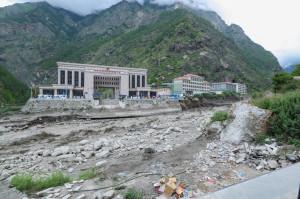Money
Indian telcos threaten to suspend internet bandwidth to Nepal
Warning follows failure of Nepali private internet firms to clear dues with Tata and Airtel, the bandwidth providers.
Krishana Prasain
Indian companies Tata and Airtel have warned that they would suspend the supply of internet bandwidth to Nepal due to payment defaults by privately-owned Nepali internet service providers (ISPs).
The ISPs have not settled the dues for the past 10 months and the Indian companies have written to them about it multiple times.
“Just last week, we again received a letter. They have threatened to stop giving the bandwidth soon if we fail to clear the dues,” said Sudhir Parajuli, president of the Internet Service Providers’ Association of Nepal.
At the root of this issue are contradictory decisions made by Nepali authorities in the past.
While the parliamentary Public Accounts Committee ruled that ISPs should be exempted from paying taxes on non-telecommunications components, the Ministry of Communication and Information Technology rejected the ruling.
According to Parajuli, the Public Accounts Committee of the past parliament ordered the government that ISPs should be exempted from paying taxes on non-telecom components like hardware, software and professional services. “Accordingly, the ISPs were exempted from the taxes in the fiscal year 2017-18.”
The parliamentary committee had also ruled that ISPs should be exempted from such taxes for another two years.
However, in its audit report, the Office of the Auditor General, the constitutional body and the supreme audit institution of Nepal, pointed out that ISPs should settle all applicable taxes and listed outstanding unsettled accounts.
Acting on the Auditor General’s report, the ministry barred ISPs from accessing foreign currency, which is needed to pay foreign vendors.
“After the Nepal Rastra Bank denied foreign exchange service to the ISPs, they were unable to settle their dues with the Indian companies,” said Parajuli.
Before making payments to their foreign vendors, the ISPs need to get permission from the regulatory body, the Nepal Telecommunication Authority, said Parajuli.
The payment for 1 terabyte purchased by Vianet, Subisu, WorldLink, and ClassicTech, among others, has been halted, he said.
According to the association, the ISPs have been buying international bandwidth from two Indian companies—Tata and Airtel.
The average bandwidth cost is $2 per Mbps per month, Parajuli said. Two years ago, it was expensive—the average price was $4 per Mbps per month—which has now dropped, he said.
The ISPs said that the ministry has asked them “verbally” to settle the due taxes, but has not issued any letter in this regard.
“There is no basis to pursue a legal remedy unless we get an official letter from the ministry instructing us to settle outstanding taxes against the parliamentary committee’s ruling,” said Parajuli.
The ISPs said that they also provide consulting services to IT companies, the non-telecom component, apart from internet services.
The government says ISPs have to pay a 6 percent royalty and 13 percent telecom service tax on such consulting services as well, said Parajuli
Following the warning from the Indian vendors last week, the ISP officials were busy knocking on the doors of the telecom regulator and the ministry seeking a resolution.
“We have informed the government about the warning. We will also meet Communications Minister Rekha Sharma this week,” Parajuli said.
If the bandwidth providers suspend the services, it will affect the public and put all systems in haywire.
“We might need to inform the public on the issue if the government does not take immediate steps to resolve it,” said Parajuli.
According to the association, the demand for internet bandwidth in Nepal is 1.75 terabytes per second. The bandwidth demand has increased by more than three times in the last five years.
According to the Management and Information System report of Nepal’s telecom regulator, the number of fixed broadband subscribers—both wired and wireless—reached 10.7 million as of mid-August, compared to 8.64 million in the same period last year.
Fixed broadband (wired) covers 40.72 percent of the total population.
There are 20 ISPs in the country.
“Nepali authorities have made conflicting decisions on the taxes, hence the confusion,” said Santosh Poudel, director of Nepal Telecommunications Authority.
The ISPs owe the government around Rs2 billion in royalty, Poudel said.
“We have asked the telecom regulator not to provide defaulting companies any recommendation for foreign exchange service until they clear outstanding royalty,” said Netra Prasad Subedi, joint secretary of the Ministry of Communication and Information Technology.
“The parliamentary Public Accounts Committee made an unnecessary intervention, creating this confusion,” Subedi said. “It’s not easy to give a tax waiver to the companies. The committee’s decision is questionable.
“All the ISPs are in profit. There is no reason to give them a tax waiver.”




 20.78°C Kathmandu
20.78°C Kathmandu














